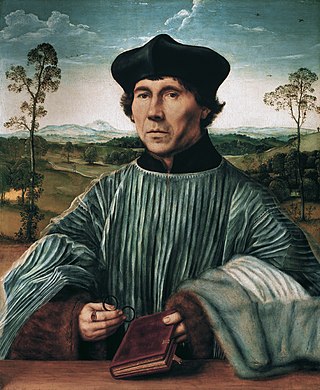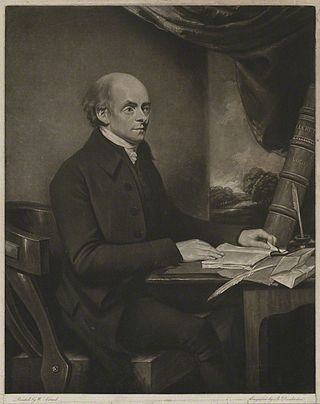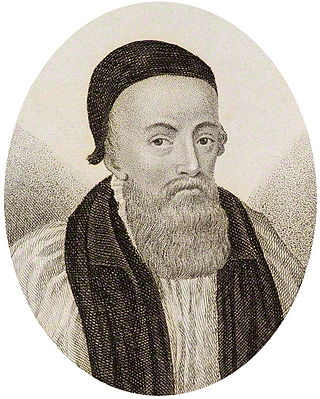Notes
- ↑ "Wakefield, Thomas (WKFT522T)". A Cambridge Alumni Database. University of Cambridge.
Thomas Wakefeld (or Wakefield) (died 1575) was an English academic, the first Regius Professor of Hebrew at Cambridge University.
He was born at Pontefract, Yorkshire. He was educated at the University of Cambridge, graduating B.A. in 1523. [1] On 9 November 1540, by then M.A., he was appointed by King Henry VIII to the newly established professorship of Hebrew at Cambridge. This carried with it membership of Trinity College.
Between 1549 and 1553, and again between 1569 and 1575, the office of reading the Hebrew lecture was discharged by others. It is likely that Wakefeld was disqualified due to alleged Roman Catholic sympathies.
He died in 1575, and was buried on 24 April at Chesterton, near Cambridge.
His Locutiones seu Phrases in Novo Testamento, quae videntur secundum proprietates linguae Hebraeae remained in manuscript.
Wakefield's brother Robert Wakefeld was also a scholar of language, and it has been suggested that John Wakefeld, gentleman, controller of the household of Archbishop Thomas Cranmer was his brother as well. Another 'Thomas Wakefeld' was servant to Cranmer in 1537. Wakefeld was twice married: first at the age of forty. He had nine children, three sons and six daughters.

Thomas Cranmer was a religious figure who was leader of the English Reformation and Archbishop of Canterbury during the reigns of Henry VIII, Edward VI and, for a short time, Mary I. He helped build the case for the annulment of Henry's marriage to Catherine of Aragon, which was one of the causes of the separation of the English Church from union with the Holy See. Along with Thomas Cromwell, he supported the principle of royal supremacy, in which the king was considered sovereign over the Church within his realm.

Nicholas Ridley was an English Bishop of London. Ridley was one of the Oxford Martyrs burned at the stake during the Marian Persecutions, for his teachings and his support of Lady Jane Grey. He is remembered with a commemoration in the calendar of saints in some parts of the Anglican Communion on 16 October.

Stephen Gardiner was an English Catholic bishop and politician during the English Reformation period who served as Lord Chancellor during the reign of Queen Mary I and King Philip.
Thomas Norton was an English lawyer, politician, writer of verse, and playwright.
The Regius Professorship of Hebrew in the University of Cambridge is an ancient academic chair at the University of Cambridge founded by King Henry VIII in 1540.

Gilbert Wakefield (1756–1801) was an English scholar and controversialist. He moved from being a cleric and academic, into tutoring at dissenting academies, and finally became a professional writer and publicist. In a celebrated state trial, he was imprisoned for a pamphlet critical of government policy of the French Revolutionary Wars; and died shortly after his release.

Sir Thomas Goodrich was an English ecclesiastic and statesman who was Bishop of Ely from 1534 until his death.

Paul Fagius was a Renaissance scholar of Biblical Hebrew and Protestant reformer.

George Day was the Bishop of Chichester.

Immanuel Tremellius was an Italian Jewish convert to Christianity. He was known as a leading Hebraist and Bible translator.
Robert Wakefield was an English linguist and scholar.
Nicholas Harpsfield (1519–1575) was an English historian and a Roman Catholic apologist and priest under Henry VIII, whose policies he opposed.
Thomas Wakefield may refer to:

John Young (1514–1580) was an English Catholic clergyman and academic. He was Master of Pembroke Hall, Cambridge, and was later imprisoned by Elizabeth I. He is not John Young (1534?–1605), Master of Pembroke Hall later in the century, and afterwards Bishop of Rochester.
Antoine Rodolphe Chevallier (1523–1572) was a French Protestant Hebraist and a holder of teaching positions in England. He acted as tutor in French and Hebrew to the future Elizabeth I of England.
Richard Bruerne (1519?–1565) was an English churchman, college head and professor of Hebrew.
Dr Richard Gwent was a senior ecclesiastical jurist, pluralist cleric and administrator through the period of the Dissolution of the Monasteries under Henry VIII. Of south Welsh origins, as a Doctor of both laws in the University of Oxford he rose swiftly to become Dean of the Arches and Archdeacon of London and of Brecon, and later of Huntingdon. He became an important figure in the operations of Thomas Cromwell, was a witness to Thomas Cranmer's private protestation on becoming Archbishop of Canterbury, and was Cranmer's Commissary and legal draftsman. He was an advocate on behalf of Katherine of Aragon in the proceedings against her, and helped to deliver the decree of annulment against Anne of Cleves.
Sir Richard Gargrave (1575–1638) was an English landowner and politician who sat in the House of Commons at various times between 1597 and 1609.
Thomas Robertson was an English clergyman and Dean of Durham in the Tudor era.
Thomas Swinnerton was an evangelical preacher and author during the English Reformation.